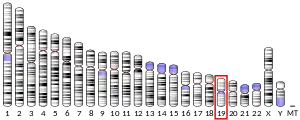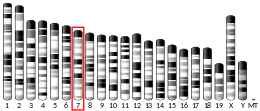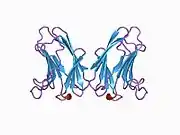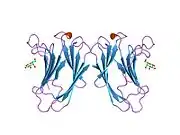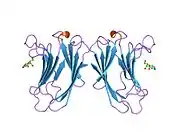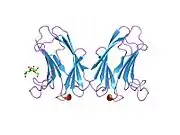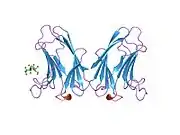| LGALS7 | |||||||||||||||||||||||||||||||||||||||||||||||||||
|---|---|---|---|---|---|---|---|---|---|---|---|---|---|---|---|---|---|---|---|---|---|---|---|---|---|---|---|---|---|---|---|---|---|---|---|---|---|---|---|---|---|---|---|---|---|---|---|---|---|---|---|
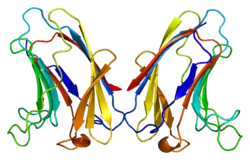 | |||||||||||||||||||||||||||||||||||||||||||||||||||
| |||||||||||||||||||||||||||||||||||||||||||||||||||
| Identifiers | |||||||||||||||||||||||||||||||||||||||||||||||||||
| Aliases | LGALS7, GAL7, LGALS7A, galectin 7 | ||||||||||||||||||||||||||||||||||||||||||||||||||
| External IDs | OMIM: 600615 MGI: 1316742 HomoloGene: 100509 GeneCards: LGALS7 | ||||||||||||||||||||||||||||||||||||||||||||||||||
| |||||||||||||||||||||||||||||||||||||||||||||||||||
| |||||||||||||||||||||||||||||||||||||||||||||||||||
| |||||||||||||||||||||||||||||||||||||||||||||||||||
| |||||||||||||||||||||||||||||||||||||||||||||||||||
| |||||||||||||||||||||||||||||||||||||||||||||||||||
| Wikidata | |||||||||||||||||||||||||||||||||||||||||||||||||||
| |||||||||||||||||||||||||||||||||||||||||||||||||||
Galectin-7 is a protein that in humans is encoded by the LGALS7 gene.[5][6][7]
The galectins are a family of beta-galactoside-binding proteins implicated in modulating cell–cell and cell–matrix interactions. Differential and in situ hybridizations indicate that this lectin is specifically expressed in keratinocytes. It is expressed at all stages of epidermal differentiation (i.e., in basal and suprabasal layers). It is moderately repressed by retinoic acid. The protein was found mainly in stratified squamous epithelium. The antigen localized to basal keratinocytes, although it was also found, albeit at lower levels, in the suprabasal layers where it concentrated to areas of cell-to-cell contact. The cellular localization and its striking down-regulation in cultured keratinocytes imply a role in cell–cell and/or cell–matrix interactions necessary for normal growth control.[7]
References
- 1 2 3 ENSG00000205076 GRCh38: Ensembl release 89: ENSG00000283082, ENSG00000205076 - Ensembl, May 2017
- 1 2 3 GRCm38: Ensembl release 89: ENSMUSG00000053522 - Ensembl, May 2017
- ↑ "Human PubMed Reference:". National Center for Biotechnology Information, U.S. National Library of Medicine.
- ↑ "Mouse PubMed Reference:". National Center for Biotechnology Information, U.S. National Library of Medicine.
- ↑ Madsen P, Rasmussen HH, Flint T, Gromov P, Kruse TA, Honore B, Vorum H, Celis JE (Apr 1995). "Cloning, expression, and chromosome mapping of human galectin-7". J Biol Chem. 270 (11): 5823–29. doi:10.1074/jbc.270.11.5823. PMID 7534301.
- ↑ Magnaldo T, Bernerd F, Darmon M (May 1995). "Galectin-7, a human 14-kDa S-lectin, specifically expressed in keratinocytes and sensitive to retinoic acid". Dev Biol. 168 (2): 259–71. doi:10.1006/dbio.1995.1078. PMID 7729568.
- 1 2 "Entrez Gene: LGALS7 lectin, galactoside-binding, soluble, 7 (galectin 7)".
Further reading
- Bonaldo MF, Lennon G, Soares MB (1997). "Normalization and subtraction: two approaches to facilitate gene discovery". Genome Res. 6 (9): 791–806. doi:10.1101/gr.6.9.791. PMID 8889548.
- Polyak K, Xia Y, Zweier JL, et al. (1997). "A model for p53-induced apoptosis". Nature. 389 (6648): 300–5. Bibcode:1997Natur.389..300P. doi:10.1038/38525. PMID 9305847. S2CID 4429638.
- Magnaldo T, Fowlis D, Darmon M (1998). "Galectin-7, a marker of all types of stratified epithelia". Differentiation. 63 (3): 159–68. doi:10.1046/j.1432-0436.1998.6330159.x. PMID 9697310.
- Leonidas DD, Vatzaki EH, Vorum H, et al. (1998). "Structural basis for the recognition of carbohydrates by human galectin-7". Biochemistry. 37 (40): 13930–40. doi:10.1021/bi981056x. PMID 9760227. S2CID 27458839.
- Bernerd F, Sarasin A, Magnaldo T (1999). "Galectin-7 overexpression is associated with the apoptotic process in UVB-induced sunburn keratinocytes". Proc. Natl. Acad. Sci. U.S.A. 96 (20): 11329–34. Bibcode:1999PNAS...9611329B. doi:10.1073/pnas.96.20.11329. PMC 18033. PMID 10500176.
- Kuwabara I, Kuwabara Y, Yang RY, et al. (2002). "Galectin-7 (PIG1) exhibits pro-apoptotic function through JNK activation and mitochondrial cytochrome c release". J. Biol. Chem. 277 (5): 3487–97. doi:10.1074/jbc.M109360200. PMID 11706006.
- Strausberg RL, Feingold EA, Grouse LH, et al. (2003). "Generation and initial analysis of more than 15,000 full-length human and mouse cDNA sequences". Proc. Natl. Acad. Sci. U.S.A. 99 (26): 16899–903. Bibcode:2002PNAS...9916899M. doi:10.1073/pnas.242603899. PMC 139241. PMID 12477932.
- Cao Z, Said N, Wu HK, et al. (2003). "Galectin-7 as a potential mediator of corneal epithelial cell migration". Arch. Ophthalmol. 121 (1): 82–6. doi:10.1001/archopht.121.1.82. PMID 12523890.
- Kopitz J, André S, von Reitzenstein C, et al. (2003). "Homodimeric galectin-7 (p53-induced gene 1) is a negative growth regulator for human neuroblastoma cells". Oncogene. 22 (40): 6277–88. doi:10.1038/sj.onc.1206631. PMID 13679866. S2CID 10990464.
- Gerhard DS, Wagner L, Feingold EA, et al. (2004). "The status, quality, and expansion of the NIH full-length cDNA project: the Mammalian Gene Collection (MGC)". Genome Res. 14 (10B): 2121–7. doi:10.1101/gr.2596504. PMC 528928. PMID 15489334.
- Saussez S, Cucu DR, Decaestecker C, et al. (2006). "Galectin 7 (p53-induced gene 1): a new prognostic predictor of recurrence and survival in stage IV hypopharyngeal cancer". Ann. Surg. Oncol. 13 (7): 999–1009. doi:10.1245/ASO.2006.08.033. PMID 16788763. S2CID 12521102.
